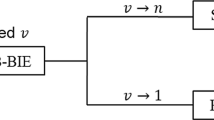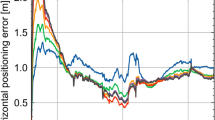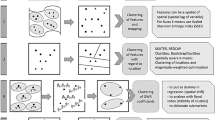Abstract
Total least squares (TLS) can solve the issue of parameter estimation in the errors-invariables (EIV) model, however, the estimated parameters are affected or even severely distorted when the observation vector and coefficient matrix are contaminated by gross errors. Currently, the use of existing robust TLS (RTLS) methods for the EIV model is unreasonable. Original residuals are directly used in most studies to construct the weight factor function, thus the robustness for the structure space is not considered. In this study, a robust weighted total least squares (RWTLS) algorithm for the partial EIV model is proposed based on Newton-Gauss method and the equivalent weight principle of general robust estimation. The algorithm utilizes the standardized residuals to construct the weight factor function and employs the median method to obtain a robust estimator of the variance component. Therefore, the algorithm possesses good robustness in both the observation and structure spaces. To obtain standardized residuals, we use the linearly approximate cofactor propagation law for deriving the expression of the cofactor matrix of WTLS residuals. The iterative procedure and precision assessment approach for RWTLS are presented. Finally, the robustness of RWTLS method is verified by two experiments involving line fitting and plane coordinate transformation. The results show that RWTLS algorithm possesses better robustness than the general robust estimation and the robust total least squares algorithm directly constructed with original residuals.
Similar content being viewed by others
References
Amiri-Simkooei A.R., 2003. Formulation of L1 norm minimization in Gauss-Markov models. J. Surv. Eng.-ASCE, 129, 37–43.
Amiri-Simkooei A.R., 2013. Application of least squares variance component estimation to errorsin- variables models. J. Geodesy, 87, 935–944.
Amiri-Simkooei A. and Jazaeri S., 2012. Weighted total least squares formulated by standard least squares theory. J. Geod. Sci., 2, 113–124.
Amiri-Simkooei A. and Jazaeri S., 2013. Data-snooping procedure applied to errors-in-variables models. Stud. Geophys. Geod., 57, 426–441.
Amiri-Simkooei A.R., Zangeneh-Nejad F., Asgari J. and Jazaeri S., 2014. Estimation of straight line parameters with fully correlated coordinates. Measurement, 48, 378–386.
Amiri-Simkooei A.R., Mortazavi S. and Asgari J., 2015. Weighted total least squares applied to mixed observation model. Surv. Rev., DOI: 10.1179/1752270615Y.0000000031.
Baarda W., 1968. A Testing Procedure for Use in Geodetic Networks. Publications on Geodesy, New Series, Vol. 2, No. 5. Netherlands Geodetic Commission, Delft, The Netherlands.
Fang X., 2013. Weighted total least squares: necessary and sufficient conditions, fixed and random parameters. J. Geodesy, 87, 733–749.
Fang X., 2014a. On non-combinatorial weighted total least squares with inequality constraints. J. Geodesy, 88, 805–816.
Fang X., 2014b. A structured and constrained total least-squares solution with cross-covariances. Stud. Geophys. Geod., 58, 1–16.
Fang X., 2014c. A total least squares solution for geodetic datum transformations. Acta Geod. Geophys., 49, 189–207.
Fang X., 2015. Weighted total least-squares with constraints: a universal formula for geodetic symmetrical transformations. J. Geodesy, 89, 459–469.
Felus Y.A., 2004. Application of total least squares for spatial point process analysis. J. Surv. Eng.-ASCE, 130, 126–133.
Felus Y.A. and Burtch R.C., 2009. On symmetrical three-dimensional datum conversion. GPS Solut., 13, 65–74.
Fekri M. and Ruiz-Gazen A., 2004. Robust weighted orthogonal regression in the errors-in-variables model. J. Multivariate Anal., 88, 89–108.
Golub G.H. and van Loan C.F., 1980. An analysis of the total least squares problem. SIAM J. Numer. Anal., 17, 883–893.
Guo J.F., 2007. Theory of Model Errors and Its Applications in GPS Data Processing. Ph.D. Thesis. Institute of Geodesy and Geophysics, Chinese Academy of Sciences, Wuhan, China (in Chinese).
Guo J.F., Ou J.K. and Wang H.T., 2010. Robust estimation for correlated observations: two local sensitivity-based downweighting strategies. J. Geodesy, 84, 243–250.
Huber P.J., 1981. Robust Statistics. John Wiley and Sons, New York.
Kelly G., 1984. The influence function in the errors in variables problem. Ann. Stat., 12, 87–100.
Lu J., Chen Y., Li B. and Fang X., 2014. Robust total least squares with reweighting iteration for three-dimensional similarity transformation. Surv. Rev., 46, 28–36.
Mahboub V., 2012. On weighted total least-squares for geodetic transformation. J. Geodesy, 86, 359–367.
Mahboub V., 2014. Variance component estimation in errors-invariables models and a rigorous total least-squares approach. Stud. Geophys. Geod., 58, 17–40.
Mahboub V., Amiri-Simkooei A.R. and Sharifi M.A., 2013. Iteratively reweighted total least squares: a robust estimation in errors-in-variables models. Surv. Rev., 45, 92–99.
Neitzel F., 2010. Generalization of total least-squares on example of unweighted and weighted 2D similarity transformation. J. Geodesy, 84, 751–762.
Ou J.K., 1999. A new method to detect gross errors–quasi-accurate detection method. Chinese Sci. Bull., 44, 1777–1781.
Rousseeuw P.J. and Leroy A.M., 1987. Robust Regression and Outlier Detection. John Wiley and Sons, New York
Schaffrin B. and Felus Y., 2008. On the multivariate total least-squares approach to empirical coordinate transformations. Three algorithms. J. Geodesy, 82, 373–383.
Schaffrin B. and Felus Y., 2009. An algorithmic approach to the total least squares problem with linear and quadratic constraints. Stud. Geophys. Geod., 53, 1–16.
Schaffrin B. and Wieser A., 2008. On weighted total least-squares adjustment for linear regression. J. Geodesy, 82, 415–421.
Schaffrin B., Lee I., Felus Y, and Choi Y., 2006. Total least-squares for geodetic straight-line and plane adjustment. Boll. Geod. Sci. Aff., 65, 141–168.
Shen Y.Z., Li B.F. and Chen Y., 2011. An iterative solution of weighted total least squares adjustment. J. Geodesy, 85, 229–238.
Snow K., 2012. Topics in Total Least-Squares Adjustment within the Errors-In-Variables Model: Singular Cofactor Matrices and Prior Information. Ph.D. Thesis. School of Earth Science, The Ohio State University, Columbus, OH.
Tao Y.Q., Gao J.X. and Yao Y.F., 2014. TLS algorithm for GPS height fitting based on robust estimation. Surv. Rev., 46, 184–188
Teunissen P.J.G., 1984. A note on the use of Gauss’ formulas in nonlinear geodetic adjustment. Statistics and Decisions, 2, 455–466.
Teunissen P.J.G., 1985. The Geometry of Geodetic Inverse Linear Mapping and Nonlinear Adjustment. Publications on Geodesy, New Series, Vol. 8, No 1. The Netherland Geodetic Commission, Delft, The Netherlands.
Teunissen P.J.G., 1988. The non-linear 2D symmetric Helmert transformation: an exact non-linear least-squares solution. J. Geodesy, 62, 1–15.
Teunissen P.J.G., 1990. Nonlinear least squares. Manuscr. Geod., 15, 137–150.
Thomson D.B., 1976. Combination of Geodetic Networks. Department of Surveying Engineering, University of New Brunswick, Fredericton, Canada.
Xu P.L., 2005. Sign-constrained robust least squares, subjective breakdown point and the effect of weights of observations on robustness. J. Geodesy, 79, 146–159.
Xu P.L. and Liu J.N., 2014. Variance components in errors-in-variables models: estimability, stability and bias analysis. J. Geodesy, 88, 719–734.
Xu P.L., Liu J.N. and Shi C., 2012. Total least squares adjustment in partial errors-in-variables models: algorithm and statistical analysis. J. Geodesy, 86, 661–675.
Yang Y., 1994. Robust estimation for dependent observations. Manuscr. Geod., 19, 10–17.
Yang Y., Song L. and Xu T., 2002a. Robust estimation for correlated observations based on bifactor equivalent weights. J. Geodesy, 76, 353–358.
Yang Y., Song L. and Xu T., 2002b. Robust parameter estimation for geodetic correlated observations. Acta Geod. Cartograph. Sinica, 31, 95–99.
Zhang S.L., Tong X.H. and Zhang K., 2013. A solution to EIV model with inequality constraints and its geodetic applications. J. Geodesy, 87, 23–28.
Zhou J.W., Huang Y.C., Yang Y.X. and Ou J.K., 1997. Robust Least Squares Method. Huazhong University of Science and Technology Press, Wuhan, China.
Author information
Authors and Affiliations
Corresponding author
Rights and permissions
About this article
Cite this article
Wang, B., Li, J. & Liu, C. A robust weighted total least squares algorithm and its geodetic applications. Stud Geophys Geod 60, 177–194 (2016). https://doi.org/10.1007/s11200-015-0916-8
Received:
Revised:
Accepted:
Published:
Issue Date:
DOI: https://doi.org/10.1007/s11200-015-0916-8




